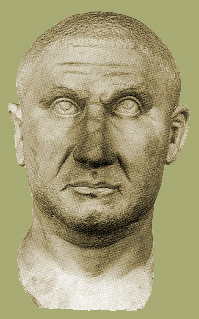Below, abridged translation from the first
volume of Karlheinz Deschner’s Kriminalgeschichte
des Christentums (Criminal History of Christianity)
Partial bust of Licinius
War against Licinius
Two emperors had disappeared; ‘Two men beloved of God’, according to Eusebius, remained. It must have been around 316 (and not 314 as it is said) when Constantine broke hostilities against Licinius in the Balkans, since the highest divinity, according to himself, ‘in his heavenly designs’ had entrusted him ‘the direction of all earthly affairs’.
The battle took place on October 8 next to Cibalae, on the banks of the Save, where Constantine, ‘a luminous beacon of Christianity’ (writes the Catholic Stockmeier) annihilated more than twenty thousand of his enemies.
This was followed, in Philippolis, of one of the most frightful massacres of the time, which did not decide the final result, but in any case Constantine had managed to snatch from his brother-in-law almost all European provinces (the current Hungary, Bulgaria, Romania, Dalmatia, Macedonia and Greece). Then he made peace with him, although Licinius was no longer a ‘beloved man of God’ but a ‘treacherous enemy’ (according to Eusebius).
Constantine dedicated ten years to rearmament and propaganda in favour of Christianity as in the East, for example in Asia Minor, half of the population was already Christian in some areas. After those ten years he rose again in search of the ‘final solution’.
The ‘saviour and benefactor’ had prepared the decisive battle through a series of political-religious measures; the Christians worked for Constantine and discredited Licinius as an ‘enemy of the civilised world’. In addition, Constantine encircled Licinius with a pact with the Armenians, by then already converted to Christianity (see the next chapter), and prepared the future war as a crusade and ‘war of religion’ (as the Catholic Franzen has said) with its regimental chaplains, its banners with the initials of Jesus Christ as an emblem of the imperial guard, and with a campaign of ‘holy enthusiasm’.
On the other side, Licinius revitalised paganism and persecuted the Church by forbidding synods, dismissing Christians from the army and the civil service, putting obstacles to the public celebration of the cult and promulgating various punishments and destructions. At the same time, Licinius celebrated other cults and oracles and put on his banners the images of various gods ‘against the false foreign god’ and ‘his dishonourable flag’. In reality, what mattered to one and the other was the exclusive power of universal monarchy.
In the summer of 324 two armies of enormous size for the time faced each other: 130,000 men, allegedly, with 200 warships and more than two thousand transport ships by Constantine, and 165,000 men (including a strong Gothic contingent) with 350 warships on the part of Licinius: figures that imply the most ruinous looting of all the resources of the empire.
On July 3, Licinius’ army was defeated on land, and so was his fleet in the Hellespont; On September 18 he lost the last and definitive battle of Chrysopolis (the current Skutari), in front of the Golden Horn, on the Asian shore of the Bosphorus.
After the defeat of Chrysopolis, Licinius retained about thirty thousand followers. At the request of Constantia, Constantine swore to respect his life, but a year later and while Licinius was in Thessalonica, where he was conspiring with the Goths according to accounts, he was strangled along with his top general.
In all the cities of the East began the extermination of the most notable supporters of Licinius, with or without judgment. So after ten years of civil war and constant campaigns of aggression on the part of Constantine, this ‘victorious general of all nations’ and ‘leader of the whole world’, a titular he made of himself, remained—and with him, Christianity—as the definitive winner and owner of the Roman Empire.
